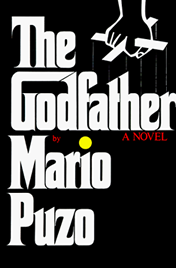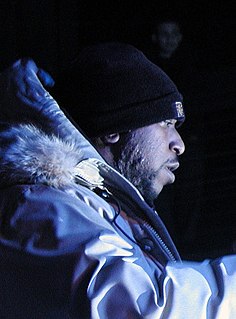
The Godfather is a crime novel by American author Mario Puzo. Originally published in 1969 by G. P. Putnam's Sons, the novel details the story of a fictional Mafia family in New York City, headed by Vito Corleone. Puzo's dedication for The Godfather is "For Anthony Cleri". The novel's epigraph is by the French author Honoré de Balzac: "Behind every great fortune there is a crime." The novel covers the years 1945 to 1955 and provides the back story of Vito Corleone from early childhood to adulthood.
Good faith, in human interactions, is a sincere intention to be fair, open, and honest, regardless of the outcome of the interaction. While some Latin phrases have lost their literal meaning over centuries, this is not the case with bona fides; it is still widely used and interchangeable with its generally accepted modern-day English translation of good faith. It is an important concept within law and business. The opposed concepts are bad faith, mala fides (duplicity) and perfidy (pretense). In contemporary English, the usage of bona fides is synonymous with credentials and identity. The phrase is sometimes used in job advertisements, and should not be confused with the bona fide occupational qualifications or the employer's good faith effort, as described below.

Benjamin "Bugsy" Siegel was a Jewish American mobster who was a driving force behind the development of the Las Vegas Strip. Siegel not only was influential within the Jewish mob but, like his friend and fellow gangster Meyer Lansky, also held significant influence within the Italian-American Mafia and the largely Italian-Jewish National Crime Syndicate. Described as handsome and charismatic, he became one of the first front-page celebrity gangsters.

Nathaniel Thomas Wilson, better known by his stage name Kool G Rap, is an American rapper from Queens. He began his career in the mid-1980s as one half of the group Kool G Rap & DJ Polo and as a member of the Juice Crew. He is often cited as one of the most influential and skilled MCs of all time, and a pioneer of mafioso rap/street/hardcore content and multisyllabic rhyming. On his album The Giancana Story, he stated that the "G" in his name stands for "Giancana", but on other occasions he has stated that it stands for "Genius".

Michael Corleone is a fictional character and the main protagonist of Mario Puzo's 1969 novel, The Godfather. In the three Godfather films, directed by Francis Ford Coppola, Michael was portrayed by Al Pacino, for which he was twice-nominated for Academy Awards. Michael is the youngest son of Vito Corleone, a Sicilian immigrant who builds a Mafia empire. Upon his father's death, Michael succeeds him as the don of the Corleone crime family.
Nemo dat quod non habet, literally meaning "no one gives what they do not have" is a legal rule, sometimes called the nemo dat rule, that states that the purchase of a possession from someone who has no ownership right to it also denies the purchaser any ownership title. It is equivalent to the civil (continental) Nemo plus iuris ad alium transferre potest quam ipse habet rule, which means "one cannot transfer to another more rights than they have". The rule usually stays valid even if the purchaser does not know that the seller has no right to claim ownership of the object of the transaction ; however, in many cases, more than one innocent party is involved, making judgment difficult for courts and leading to numerous exceptions to the general rule that aim to give a degree of protection to bona fide purchasers and original owners. The possession of the good of title will be with the original owner.

The United States Senate Special Committee to Investigate Crime in Interstate Commerce was a special committee of the United States Senate which existed from 1950 to 1951 and which investigated organized crime which crossed state borders in the United States. The committee became popularly known as the Kefauver Committee because of its chairman, Senator Estes Kefauver. The term capo di tutti capi was introduced to the U.S. public by the Kefauver Commission.

Alessandro Federico Petricone Jr., known professionally as Alex Rocco, was an American actor. Often cast as a villain, he is best known for his portrayal of Moe Greene in The Godfather and his Primetime Emmy Award-winning role in The Famous Teddy Z. He did a significant amount of voice-over work later in his career, and was known for his gravelly voice.

Hyman Roth is a fictional character and the main antagonist in the 1974 film The Godfather Part II. He is also a minor character in the 2004 novel The Godfather Returns. Roth is a Jewish mobster and investor and a business partner of Vito Corleone, and later his son Michael Corleone. He is based on New York mobster Meyer Lansky and was played by Lee Strasberg in the movie. It was Al Pacino who suggested Strasberg, his former acting teacher, for the role.

Albert Neri is a fictional character appearing in Mario Puzo's 1969 novel The Godfather and Francis Ford Coppola's trilogy of films based on it. In all three motion pictures, he is portrayed by actor Richard Bright. He functions as Michael Corleone's personal enforcer, bodyguard and assassin.

Morris "Moe" Greene is a fictional character appearing in Mario Puzo's 1969 novel The Godfather and the 1972 film of the same name. Both Greene's character and personality are based on Bugsy Siegel: his affiliation with the mob in Los Angeles, his involvement in the development of Las Vegas, and his flamboyant tendencies. Greene is portrayed in the movie by Alex Rocco.

Jewish-American organized crime emerged within the American Jewish community during the late 19th and early 20th centuries. It has been referred to variously in media and popular culture as the Jewish Mob, Jewish Mafia, Kosher Mafia, Kosher Nostra, or Undzer Shtik. The last two of these terms are direct references to the Italian Cosa Nostra; the former is a play on the word kosher, referring to Jewish dietary laws, while the latter is a direct translation of the Italian phrase Cosa Nostra into Yiddish, which was at the time the predominant language of the Jewish diaspora in the United States.
The Cleveland crime family or Cleveland Mafia is the collective name given to a succession of Italian-American organized crime gangs based in Cleveland, Ohio, in the United States. A part of the Italian-American Mafia movement, it operates in the Greater Cleveland area. Founded about 1920, leadership turned over frequently due to a series of power grabs and assassinations. Stability emerged in 1930 after Frank Milano became boss. The organization underwent significant decline in the last years of boss John T. Scalish. After his death in 1976, Irish mobster Danny Greene attempted to take over the Cleveland crime family. A violent gang war broke out which drew significant law enforcement attention. Significantly reduced in membership and influence, the Cleveland crime family nearly ceased to exist in the 1990s after a number of high-ranking members were imprisoned. The organization is believed by law enforcement to be extremely small in the 21st century, although attempting to rebuild.
In the 19th and early 20th centuries, African-American organized crime emerged following the large-scale migration of African Americans to major cities of the Northeast, Midwest, and later the West Coast. In many of these newly established communities and neighborhoods, criminal activities such as illegal gambling, speakeasies and bootlegging were seen in the post-World War I and Prohibition eras. Although the majority of these businesses were operated by African Americans, it is unclear to the extent these operations were run independently of the larger criminal organizations of the time.
Gus Greenbaum was an American gangster in the casino industry, best known for taking over management of the Flamingo Hotel in Las Vegas after the murder of co-founder Bugsy Siegel.
In employment law, a bona fide occupational qualification (BFOQ) (US) or bona fide occupational requirement (BFOR) (Canada) or genuine occupational qualification (GOQ) (UK) is a quality or an attribute that employers are allowed to consider when making decisions on the hiring and retention of employees—a quality that when considered in other contexts would constitute discrimination and thus be in violation of civil rights employment law. Such qualifications must be listed in the employment offering.

The Godfather II is an open world action-adventure video game developed by EA Redwood Shores and published by Electronic Arts for Microsoft Windows, PlayStation 3 and Xbox 360. It was released worldwide for all platforms in April 2009.
This is a glossary of words related to the Mafia, primarily the Italian American Mafia and Sicilian Mafia.
{{#if:{{{1}}}|{{#tag:li|{{{1}}}|style="{{{style|}}}"|id="alist{{{name}}}{{1x|-}}{{{i}}}"}}}}{{#if:{{{1}}}|{{#tag:li|{{{1}}}|style="{{{style|}}}"|id="alist{{{name}}}{{1x|-}}{{{i}}}"}}}}{{#if:{{{1}}}|{{#tag:li|{{{1}}}|style="{{{style|}}}"|id="alist{{{name}}}{{1x|-}}{{{i}}}"}}}}{{#if:{{{1}}}|{{#tag:li|{{{1}}}|style="{{{style|}}}"|id="alist{{{name}}}{{1x|-}}{{{i}}}"}}}}{{#if:{{{1}}}|{{#tag:li|{{{1}}}|style="{{{style|}}}"|id="alist{{{name}}}{{1x|-}}{{{i}}}"}}}}{{#if:{{{1}}}|{{#tag:li|{{{1}}}|style="{{{style|}}}"|id="alist{{{name}}}{{1x|-}}{{{i}}}"}}}}{{#if:{{{1}}}|{{#tag:li|{{{1}}}|style="{{{style|}}}"|id="alist{{{name}}}{{1x|-}}{{{i}}}"}}}}{{#if:{{{1}}}|{{#tag:li|{{{1}}}|style="{{{style|}}}"|id="alist{{{name}}}{{1x|-}}{{{i}}}"}}}}{{#if:{{{1}}}|{{#tag:li|{{{1}}}|style="{{{style|}}}"|id="alist{{{name}}}{{1x|-}}{{{i}}}"}}}}{{#if:{{{1}}}|{{#tag:li|{{{1}}}|style="{{{style|}}}"|id="alist{{{name}}}{{1x|-}}{{{i}}}"}}}}{{#if:{{{1}}}|{{#tag:li|{{{1}}}|style="{{{style|}}}"|id="alist{{{name}}}{{1x|-}}{{{i}}}"}}}}{{#if:{{{1}}}|{{#tag:li|{{{1}}}|style="{{{style|}}}"|id="alist{{{name}}}{{1x|-}}{{{i}}}"}}}}{{#if:{{{1}}}|{{#tag:li|{{{1}}}|style="{{{style|}}}"|id="alist{{{name}}}{{1x|-}}{{{i}}}"}}}}{{#if:{{{1}}}|{{#tag:li|{{{1}}}|style="{{{style|}}}"|id="alist{{{name}}}{{1x|-}}{{{i}}}"}}}}{{#if:{{{1}}}|{{#tag:li|{{{1}}}|style="{{{style|}}}"|id="alist{{{name}}}{{1x|-}}{{{i}}}"}}}}{{#if:{{{1}}}|{{#tag:li|{{{1}}}|style="{{{style|}}}"|id="alist{{{name}}}{{1x|-}}{{{i}}}"}}}}{{#if:{{{1}}}|{{#tag:li|{{{1}}}|style="{{{style|}}}"|id="alist{{{name}}}{{1x|-}}{{{i}}}"}}}}{{#if:{{{1}}}|{{#tag:li|{{{1}}}|style="{{{style|}}}"|id="alist{{{name}}}{{1x|-}}{{{i}}}"}}}}{{#if:{{{1}}}|{{#tag:li|{{{1}}}|style="{{{style|}}}"|id="alist{{{name}}}{{1x|-}}{{{i}}}"}}}}{{#if:{{{1}}}|{{#tag:li|{{{1}}}|style="{{{style|}}}"|id="alist{{{name}}}{{1x|-}}{{{i}}}"}}}}{{#if:{{{1}}}|{{#tag:li|{{{1}}}|style="{{{style|}}}"|id="alist{{{name}}}{{1x|-}}{{{i}}}"}}}}{{#if:{{{1}}}|{{#tag:li|{{{1}}}|style="{{{style|}}}"|id="alist{{{name}}}{{1x|-}}{{{i}}}"}}}}{{#if:{{{1}}}|{{#tag:li|{{{1}}}|style="{{{style|}}}"|id="alist{{{name}}}{{1x|-}}{{{i}}}"}}}}{{#if:{{{1}}}|{{#tag:li|{{{1}}}|style="{{{style|}}}"|id="alist{{{name}}}{{1x|-}}{{{i}}}"}}}}{{#if:{{{1}}}|{{#tag:li|{{{1}}}|style="{{{style|}}}"|id="alist{{{name}}}{{1x|-}}{{{i}}}"}}}}{{#if:{{{1}}}|{{#tag:li|{{{1}}}|style="{{{style|}}}"|id="alist{{{name}}}{{1x|-}}{{{i}}}"}}}}{{#if:{{{1}}}|{{#tag:li|{{{1}}}|style="{{{style|}}}"|id="alist{{{name}}}{{1x|-}}{{{i}}}"}}}}{{#if:{{{1}}}|{{#tag:li|{{{1}}}|style="{{{style|}}}"|id="alist{{{name}}}{{1x|-}}{{{i}}}"}}}}{{#if:{{{1}}}|{{#tag:li|{{{1}}}|style="{{{style|}}}"|id="alist{{{name}}}{{1x|-}}{{{i}}}"}}}}{{#if:{{{1}}}|{{#tag:li|{{{1}}}|style="{{{style|}}}"|id="alist{{{name}}}{{1x|-}}{{{i}}}"}}}}{{#if:{{{1}}}|{{#tag:li|{{{1}}}|style="{{{style|}}}"|id="alist{{{name}}}{{1x|-}}{{{i}}}"}}}}{{#if:{{{1}}}|{{#tag:li|{{{1}}}|style="{{{style|}}}"|id="alist{{{name}}}{{1x|-}}{{{i}}}"}}}}{{#if:{{{1}}}|{{#tag:li|{{{1}}}|style="{{{style|}}}"|id="alist{{{name}}}{{1x|-}}{{{i}}}"}}}}{{#if:{{{1}}}|{{#tag:li|{{{1}}}|style="{{{style|}}}"|id="alist{{{name}}}{{1x|-}}{{{i}}}"}}}}{{#if:{{{1}}}|{{#tag:li|{{{1}}}|style="{{{style|}}}"|id="alist{{{name}}}{{1x|-}}{{{i}}}"}}}}{{#if:{{{1}}}|{{#tag:li|{{{1}}}|style="{{{style|}}}"|id="alist{{{name}}}{{1x|-}}{{{i}}}"}}}}{{#if:{{{1}}}|{{#tag:li|{{{1}}}|style="{{{style|}}}"|id="alist{{{name}}}{{1x|-}}{{{i}}}"}}}}{{#if:{{{1}}}|{{#tag:li|{{{1}}}|style="{{{style|}}}"|id="alist{{{name}}}{{1x|-}}{{{i}}}"}}}}{{#if:{{{1}}}|{{#tag:li|{{{1}}}|style="{{{style|}}}"|id="alist{{{name}}}{{1x|-}}{{{i}}}"}}}}{{#if:{{{1}}}|{{#tag:li|{{{1}}}|style="{{{style|}}}"|id="alist{{{name}}}{{1x|-}}{{{i}}}"}}}}{{#if:{{{1}}}|{{#tag:li|{{{1}}}|style="{{{style|}}}"|id="alist{{{name}}}{{1x|-}}{{{i}}}"}}}}{{#if:{{{1}}}|{{#tag:li|{{{1}}}|style="{{{style|}}}"|id="alist{{{name}}}{{1x|-}}{{{i}}}"}}}}{{#if:{{{1}}}|{{#tag:li|{{{1}}}|style="{{{style|}}}"|id="alist{{{name}}}{{1x|-}}{{{i}}}"}}}}{{#if:{{{1}}}|{{#tag:li|{{{1}}}|style="{{{style|}}}"|id="alist{{{name}}}{{1x|-}}{{{i}}}"}}}}{{#if:{{{1}}}|{{#tag:li|{{{1}}}|style="{{{style|}}}"|id="alist{{{name}}}{{1x|-}}{{{i}}}"}}}}{{#if:{{{1}}}|{{#tag:li|{{{1}}}|style="{{{style|}}}"|id="alist{{{name}}}{{1x|-}}{{{i}}}"}}}}{{#if:{{{1}}}|{{#tag:li|{{{1}}}|style="{{{style|}}}"|id="alist{{{name}}}{{1x|-}}{{{i}}}"}}}}{{#if:{{{1}}}|{{#tag:li|{{{1}}}|style="{{{style|}}}"|id="alist{{{name}}}{{1x|-}}{{{i}}}"}}}}{{#if:{{{1}}}|{{#tag:li|{{{1}}}|style="{{{style|}}}"|id="alist{{{name}}}{{1x|-}}{{{i}}}"}}}}{{#if:{{{1}}}|{{#tag:li|{{{1}}}|style="{{{style|}}}"|id="alist{{{name}}}{{1x|-}}{{{i}}}"}}}}{{#if:{{{1}}}|{{#tag:li|{{{1}}}|style="{{{style|}}}"|id="alist{{{name}}}{{1x|-}}{{{i}}}"}}}}{{#if:{{{1}}}|{{#tag:li|{{{1}}}|style="{{{style|}}}"|id="alist{{{name}}}{{1x|-}}{{{i}}}"}}}}{{#if:{{{1}}}|{{#tag:li|{{{1}}}|style="{{{style|}}}"|id="alist{{{name}}}{{1x|-}}{{{i}}}"}}}}{{#if:{{{1}}}|{{#tag:li|{{{1}}}|style="{{{style|}}}"|id="alist{{{name}}}{{1x|-}}{{{i}}}"}}}}{{#if:{{{1}}}|{{#tag:li|{{{1}}}|style="{{{style|}}}"|id="alist{{{name}}}{{1x|-}}{{{i}}}"}}}}{{#if:{{{1}}}|{{#tag:li|{{{1}}}|style="{{{style|}}}"|id="alist{{{name}}}{{1x|-}}{{{i}}}"}}}}{{#if:{{{1}}}|{{#tag:li|{{{1}}}|style="{{{style|}}}"|id="alist{{{name}}}{{1x|-}}{{{i}}}"}}}}{{#if:{{{1}}}|{{#tag:li|{{{1}}}|style="{{{style|}}}"|id="alist{{{name}}}{{1x|-}}{{{i}}}"}}}}{{#if:{{{1}}}|{{#tag:li|{{{1}}}|style="{{{style|}}}"|id="alist{{{name}}}{{1x|-}}{{{i}}}"}}}}{{#if:{{{1}}}|{{#tag:li|{{{1}}}|style="{{{style|}}}"|id="alist{{{name}}}{{1x|-}}{{{i}}}"}}}}{{#if:{{{1}}}|{{#tag:li|{{{1}}}|style="{{{style|}}}"|id="alist{{{name}}}{{1x|-}}{{{i}}}"}}}}{{#if:{{{1}}}|{{#tag:li|{{{1}}}|style="{{{style|}}}"|id="alist{{{name}}}{{1x|-}}{{{i}}}"}}}}{{#if:{{{1}}}|{{#tag:li|{{{1}}}|style="{{{style|}}}"|id="alist{{{name}}}{{1x|-}}{{{i}}}"}}}}{{#if:{{{1}}}|{{#tag:li|{{{1}}}|style="{{{style|}}}"|id="alist{{{name}}}{{1x|-}}{{{i}}}"}}}}{{#if:{{{1}}}|{{#tag:li|{{{1}}}|style="{{{style|}}}"|id="alist{{{name}}}{{1x|-}}{{{i}}}"}}}}{{#if:{{{1}}}|{{#tag:li|{{{1}}}|style="{{{style|}}}"|id="alist{{{name}}}{{1x|-}}{{{i}}}"}}}}{{#if:{{{1}}}|{{#tag:li|{{{1}}}|style="{{{style|}}}"|id="alist{{{name}}}{{1x|-}}{{{i}}}"}}}}{{#if:{{{1}}}|{{#tag:li|{{{1}}}|style="{{{style|}}}"|id="alist{{{name}}}{{1x|-}}{{{i}}}"}}}}{{#if:{{{1}}}|{{#tag:li|{{{1}}}|style="{{{style|}}}"|id="alist{{{name}}}{{1x|-}}{{{i}}}"}}}}{{#if:{{{1}}}|{{#tag:li|{{{1}}}|style="{{{style|}}}"|id="alist{{{name}}}{{1x|-}}{{{i}}}"}}}}{{#if:{{{1}}}|{{#tag:li|{{{1}}}|style="{{{style|}}}"|id="alist{{{name}}}{{1x|-}}{{{i}}}"}}}}{{#if:{{{1}}}|{{#tag:li|{{{1}}}|style="{{{style|}}}"|id="alist{{{name}}}{{1x|-}}{{{i}}}"}}}}{{#if:{{{1}}}|{{#tag:li|{{{1}}}|style="{{{style|}}}"|id="alist{{{name}}}{{1x|-}}{{{i}}}"}}}}{{#if:{{{1}}}|{{#tag:li|{{{1}}}|style="{{{style|}}}"|id="alist{{{name}}}{{1x|-}}{{{i}}}"}}}}{{#if:{{{1}}}|{{#tag:li|{{{1}}}|style="{{{style|}}}"|id="alist{{{name}}}{{1x|-}}{{{i}}}"}}}}{{#if:{{{1}}}|{{#tag:li|{{{1}}}|style="{{{style|}}}"|id="alist{{{name}}}{{1x|-}}{{{i}}}"}}}}{{#if:{{{1}}}|{{#tag:li|{{{1}}}|style="{{{style|}}}"|id="alist{{{name}}}{{1x|-}}{{{i}}}"}}}}{{#if:{{{1}}}|{{#tag:li|{{{1}}}|style="{{{style|}}}"|id="alist{{{name}}}{{1x|-}}{{{i}}}"}}}}{{#if:{{{1}}}|{{#tag:li|{{{1}}}|style="{{{style|}}}"|id="alist{{{name}}}{{1x|-}}{{{i}}}"}}}}{{#if:{{{1}}}|{{#tag:li|{{{1}}}|style="{{{style|}}}"|id="alist{{{name}}}{{1x|-}}{{{i}}}"}}}}{{#if:{{{1}}}|{{#tag:li|{{{1}}}|style="{{{style|}}}"|id="alist{{{name}}}{{1x|-}}{{{i}}}"}}}}{{#if:{{{1}}}|{{#tag:li|{{{1}}}|style="{{{style|}}}"|id="alist{{{name}}}{{1x|-}}{{{i}}}"}}}}{{#if:{{{1}}}|{{#tag:li|{{{1}}}|style="{{{style|}}}"|id="alist{{{name}}}{{1x|-}}{{{i}}}"}}}}{{#if:{{{1}}}|{{#tag:li|{{{1}}}|style="{{{style|}}}"|id="alist{{{name}}}{{1x|-}}{{{i}}}"}}}}{{#if:{{{1}}}|{{#tag:li|{{{1}}}|style="{{{style|}}}"|id="alist{{{name}}}{{1x|-}}{{{i}}}"}}}}{{#if:{{{1}}}|{{#tag:li|{{{1}}}|style="{{{style|}}}"|id="alist{{{name}}}{{1x|-}}{{{i}}}"}}}}{{#if:{{{1}}}|{{#tag:li|{{{1}}}|style="{{{style|}}}"|id="alist{{{name}}}{{1x|-}}{{{i}}}"}}}}{{#if:{{{1}}}|{{#tag:li|{{{1}}}|style="{{{style|}}}"|id="alist{{{name}}}{{1x|-}}{{{i}}}"}}}}{{#if:{{{1}}}|{{#tag:li|{{{1}}}|style="{{{style|}}}"|id="alist{{{name}}}{{1x|-}}{{{i}}}"}}}}{{#if:{{{1}}}|{{#tag:li|{{{1}}}|style="{{{style|}}}"|id="alist{{{name}}}{{1x|-}}{{{i}}}"}}}}{{#if:{{{1}}}|{{#tag:li|{{{1}}}|style="{{{style|}}}"|id="alist{{{name}}}{{1x|-}}{{{i}}}"}}}}{{#if:{{{1}}}|{{#tag:li|{{{1}}}|style="{{{style|}}}"|id="alist{{{name}}}{{1x|-}}{{{i}}}"}}}}{{#if:{{{1}}}|{{#tag:li|{{{1}}}|style="{{{style|}}}"|id="alist{{{name}}}{{1x|-}}{{{i}}}"}}}}{{#if:{{{1}}}|{{#tag:li|{{{1}}}|style="{{{style|}}}"|id="alist{{{name}}}{{1x|-}}{{{i}}}"}}}}{{#if:{{{1}}}|{{#tag:li|{{{1}}}|style="{{{style|}}}"|id="alist{{{name}}}{{1x|-}}{{{i}}}"}}}}{{#if:{{{1}}}|{{#tag:li|{{{1}}}|style="{{{style|}}}"|id="alist{{{name}}}{{1x|-}}{{{i}}}"}}}}{{#if:{{{1}}}|{{#tag:li|{{{1}}}|style="{{{style|}}}"|id="alist{{{name}}}{{1x|-}}{{{i}}}"}}}}{{#if:{{{1}}}|{{#tag:li|{{{1}}}|style="{{{style|}}}"|id="alist{{{name}}}{{1x|-}}{{{i}}}"}}}}{{#if:{{{1}}}|{{#tag:li|{{{1}}}|style="{{{style|}}}"|id="alist{{{name}}}{{1x|-}}{{{i}}}"}}}}

Moe Sedway was an American businessman and mobster. He was an associate of Benjamin Siegel and a faithful lieutenant of organized crime czar Meyer Lansky. He and Gus Greenbaum made the Flamingo Hotel & Casino in Las Vegas very successful after Siegel's murder.

Mann v Goldstein [1968] 1 WLR 1091 is a UK insolvency law case concerning the bringing of a winding up petition when a company is alleged to be unable to repay its debts.












